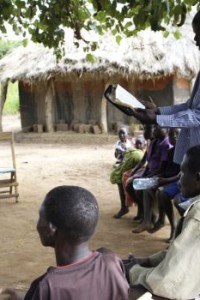“Are local churches enabling citizens to have greater access to government information? If so, to what extent? How are they doing it?” — Tearfund
January 2016 End date
September 2016
Issue
Communities in Uganda are involved in identifying and prioritising issues that they believe local government resources and budgets should be spent on.
Churches can play a part in this, inspiring citizens and building their capacity to identify issues, draw down local government resources to address them, and then hold local government accountable.
Project
As part of its work in Uganda, Tearfund and its partner, Pentecostal Assemblies of God, has been piloting a programme that encourages church communities to engage in local-level advocacy. Initial findings indicate that this has been successful.
This action research project will capture the key learning from the advocacy pilot programme, in order to identify, analyse and better understand the strengths, challenges and distinctive characteristics of local churches that are successfully catalysing citizens to engage with their local government.
The research will consider issues of transparency, citizen empowerment, exclusion and inclusion, government responsiveness and power dynamics. The overall aim is for the learning from this advocacy programme in Uganda to be scaled out to other programmes.
Related projects
Partner
Tearfund is a leading relief and development charity that works in partnership with Christian agencies and churches worldwide to tackle the causes and effects of poverty. It is a faith-based organisation that envisions and empowers local churches in order to see communities developed, disasters responded to, and governments held accountable.
Learning
Tearfund's research explains how Tearfund set out to learn from and enhance its ‘Church and Community Mobilisation’ (CCM) advocacy programme, in the Teso region of east Uganda. It carried out research in 18 communities where the CCM advocacy process was being implemented by a partner church.
The research provides valuable insights into the strengths and weaknesses of conducting local-level advocacy through churches.
- Transparency – Although churches provided some information on government programmes, access to freely available information on government plans, policies and budgets still needs strengthening.
- Citizen empowerment – Where the CCM advocacy process was running, citizen engagement in local governance decisions was markedly improved. Generally, people who had never participated before were attending dialogues and influencing some decisions. It was, however, proving difficult to encourage more people to be involved when the CCM process had finished.
- Inclusion – Although the inclusion of marginalised groups was a feature of CCM, it was difficult to know if everyone outside the community felt able to attend. The church can play a role in advocating on behalf of marginalised groups who struggle to be at meetings, but it should include them from the start.
- Government responsiveness – This increased in many places where CCM advocacy took place, with response times decreasing from over five years to just one year in many cases. However, there were still delays and funding problems, which had a negative effect on community engagement and relationships with government.
- Power dynamics –The CCM advocacy process created positive change in power dynamics, enabling any internalised sense of inferiority to be overturned, as people saw their identity differently and understood their potential to explore new initiatives.
Check out Tearfund's Policy Matters blog about the research. Download a two-page summary of the research here. We're looking forward to a forthcoming practice paper will see Tearfund reflecting on what they learned, and how they are taking it forward in their work.
Publications
-
 View publication
View publication
Bridging the gap: the role of local…